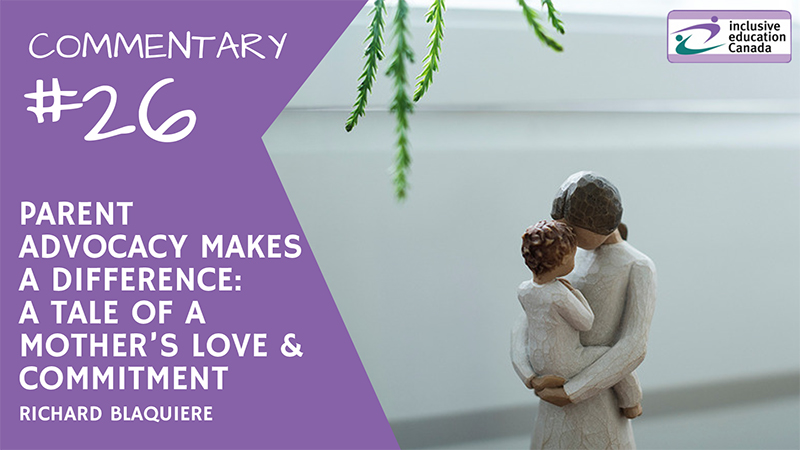 National Inclusive Education Month Commentary #26
National Inclusive Education Month Commentary #26
By Richard Blaquiere, Writer and Advocate
In these past several months we in New Brunswick have observed continuing efforts by both the media and, to some degree, the New Brunswick Teachers’ Association, to undermine the great success achieved in our Inclusive schools with children needing extra support to realize their potential. The mandate for this support is laid out in NB’s Policy 322 issued in September 2013. This negative media campaign, rife with generalizations and devoid of compassion and common sense, may give fodder to administrators and others who oppose the concept of all children being taught with their peers in safe and nurturing community-based schools.
Little thought appears to be given to how the parents of special needs children perceive public assaults on their young ones. The constant dredging up of non-specific references of violence perpetrated by children covered by Policy 322 are insensitive and misrepresentative of the day-to-day reality of a child in need of support in the classroom. More funding is called for, more funding is provided, yet the complaints continue.
You are less likely to hear complaints from school staff about inadequate funding and lack of resources If you are lucky enough to have your child in a school with an administration and support team that share a vision that values and sees the potential in all children. That isn’t to say that everything goes smoothly or is perfect in these schools but it does speak to priorities. And if there are blocks to implementing an inclusive and nurturing learning environment, be they systemic or human constructed, a caring school works around or through them.
Not all schools are staffed by educators who share the vision, the drive and the patience to make Inclusion work. In December of 2016 a message was posted to the Autism Family Friendship Group – of which I am director – from a parent whose child is on the autism spectrum. He was being excluded from a grade eight trip to Quebec City! All children registered in French classes were eligible to attend except for this young man. He is considered to have some quite significant obstacles to learning and the school had pulled him from French class for one-on-one time in other areas. This removal from French instruction then became the excuse for refusing him permission to participate with his peers on the trip. The trip was for students in the French class and he wasn’t in the class. As a consequence, he was excluded from a trip he had been looking forward to since planning had started at the beginning of the school year.
When I heard the mom’s story I realized that the school’s handling of this situation in no way reflected either the spirit or the letter of the policy on Inclusive Education. Policy 322 requires administrators to “ensure that all students have access to co-curricular and school-sponsored activities, including access to transportation in school vehicles.” The school’s action just appeared mean-spirited and lazy.
I began to serve in an unofficial capacity as adviser to the family. What followed was six months of tears, disappointment, and head-banging frustration. Once we began citing specific elements of Policy 322 to the principal, elements that supported the young man’s participation on the adventure, the story from the school changed. They now said that he couldn’t handle the long bus ride to Quebec and were afraid he might go haywire en route. The mom told them otherwise. “He doesn’t go haywire!”, she told the administrator. “He retreats within.” An appeal was made to senior leaders in the local school district. Despite significant effort by the mother and advocates, initial approaches were dismissed or ignored.
Around this time, we contacted the New Brunswick Association for Community Living, the province’s most prominent advocacy group for children and adults with intellectual and developmental delays. Upon hearing the mom’s story, NBACL was on the team. On the family’s behalf, NBACL also petitioned the principal who nonetheless held fast to the exclusion decision the school had adopted.
After considerable deliberation, the mom subsequently filed a complaint with the NB Human Right’s Commission. After a review of her submission, the commission agreed to mediate the case and the school was subsequently contacted. Faced with all of this push back from the mom and her supporters, the principal presented the family with what on the surface seemed like a conciliatory gesture. The school conceded that the child could go on the trip but not on the bus with his peers. The family could bring him in a separate vehicle and his participation in the events would be limited and only in those that school officials felt he could handle. The family and those of us working in support roles considered this a token offer and we were both disappointed and outraged. The dad wondered if the school would demand his son be kept on a leash. The mom was in tears. But the school’s proposal only strengthened her resolve.
While the school’s plan was unsatisfactory, we immediately decided to regard this development as, in effect, good news. The door was opened a crack. It was now time to kick it open all the way.
It was then we contacted Oromocto MLA Jody Carr, who had been the NB Minister of Education and who signed Policy 322 (Inclusive Education) in 2013. Carr made personal calls to decision makers at the Department of Education and advised them that he was committed to supporting the family with this situation. The mom was about to go public, charging discrimination in violation of both Policy 322 and the NB Human Rights Act. The only way to halt the presses and mitigate the negative publicity, Carr advised department officials, was to follow the law and direct the principal to comply.
Carr knows the system and shared the circumstances with New Brunswick’s current Education Minister, Hon. Brian Kenny. The minister was immediately sympathetic. He supports the policy, understood the situation, and recognized the important priorities reflected in the parent’s request. Acceptance of children covered by the Inclusion Policy has been a bi-partisan issue in New Brunswick. Minister Kenny acted to sustain this tradition in a clear and decisive manner.
On June 15, two weeks before the bus was to leave and nearly six months after the family began the struggle, word was received that mother and child would both be on the bus to Quebec City and that the young man would be able to participate in as many events as he had the energy and inclination for. The department even made provision for an education assistant to be on hand to provide extra help.
The young man had “the trip of a life time” recounts the mom. So did she! He danced and laughed and was excited as anyone would be to share this adventure with his peers.
Inclusion works if you have an administrator and staff who believe in it. It works when the school has an entrenched and accessible support system. It works if school leaders work with parents to overcome challenges. It works if leaders act to support inclusion and demonstrate by their actions that they are committed to every student. It works if the school respects and reflects the love every parent has for their child.
 Richard Blaquiere is a former teacher and co-founder and current director of the Woodstock NB based Autism Family Friendship Group. He has been a leader in social justice and human rights issues in New Brunswick. Richard was a recipient of the New Brunswick Human Rights Award and is a pioneer of school initiatives in support of LGBTQ youth in New Brunswick schools.
Richard Blaquiere is a former teacher and co-founder and current director of the Woodstock NB based Autism Family Friendship Group. He has been a leader in social justice and human rights issues in New Brunswick. Richard was a recipient of the New Brunswick Human Rights Award and is a pioneer of school initiatives in support of LGBTQ youth in New Brunswick schools.
